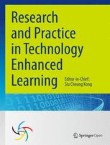Research and Practice in Technology Enhanced Learning welcomes submissions to the thematic series on Interest-Driven Creation (IDC) Theory: Experiences and Challenges.
Asian education is known for its examination-driven orientation, with the downsides of distorting the processes of learning and teaching, diminishing students’ interest in learning, and failing to nurture twenty-first century competencies among students. A group of Asian researchers have been developing Interest-Driven Creator (IDC) Theory (Chan, Looi, Chen, Wong, et al., 2018), a design theory based on three anchored concepts, namely interest, creation, and habit. Each of these anchored concepts is represented by a loop composed of three components.
It is hypothesized that technology-supported learning activities that are designed with reference to IDC Theory will enable students to develop interest in learning, be immersed in the creation process, and, by repeating this process in their daily routines, strengthen habits of creation. Furthermore, students will excel in learning performance, develop 21st century competencies, and become lifelong interest-driven creators.
To sharpen our understanding and further the development of the theory, we need more discussion and collaborative efforts in the Asian research community and beyond. Hypotheses arising from this theory can be tested, revised, or refined by setting up and investigating IDC Theory based experimental sites. By disseminating the framework, foundations, and practices to the various countries and regions of Asia, we hope that it will bring about compelling examples and hence a form of quality education for the twenty-first century, which is an alternative to the examination-driven education system.
This thematic series is targeted towards empirical research that addresses the ground-level applications of IDC (including design, development, implementation and evaluation of IDC in learning and education). We hope that more discourse will center on an understanding of how to design learning that involves the loops appropriately: whether to use them as predictive, descriptive, prescriptive or proscriptive mechanisms. We would like to invite scholars from various disciplines and regions of the world to provide responses to the current articulation of IDC Theory, so that as a community effort, we can move forward the tenets of the theory to serve as a guide to future learners in developing, sustaining and growing their interests, to provide opportunities for creating and solving challenging problems and tasks, and to make these repertoires habitual processes so that learners get better and in regulating their own learning to be habitual interest-driven creators.
Potential topics include but are not limited to:
- Design principles of IDC for learning
- Applications of IDC or components of IDC Theory, namely, interest, creation and habits in learning
- Post-facto (retrospective) analysis of the progressive development of IDC in learning
- Case studies on the learning trajectories of individual learners or learner communities in the lens of IDC
- Impact of IDC in learning and education
- Conditions and challenges in nurturing the Habit of IDC
Submission Instructions
Before submitting your manuscript, please ensure you have carefully read the submission guidelines for Research and Practice in Technology Enhanced Learning. The complete manuscript should be submitted through the Research and Practice in Technology Enhanced Learning submission system. To ensure that you submit to the correct thematic series please select the appropriate thematic series in the drop-down menu upon submission. In addition, indicate within your cover letter that you wish your manuscript to be considered as part of the thematic series on Interest-Driven Creation (IDC) Theory: Experiences and Challenges. All submissions will undergo rigorous peer review and accepted articles will be published within the journal as a collection.
Guest Editors
Wenli Chen, Nanyang Technological University, Singapore
Lung Hsiang Wong, Nanyang Technological University, Singapore
Sanna Järvelä, University of Oulu, Finland
Charles Crook, University of Nottingham, UK
Submissions will also benefit from the usual advantages of open access publication:
• Rapid publication: Online submission, electronic peer review and production make the process of publishing your article simple and efficient
• High visibility and international readership in your field: Open access publication ensures high visibility and maximum exposure for your work - anyone with online access can read your article
• No space constraints: Publishing online means unlimited space for figures, extensive data and video footage
• Authors retain copyright, licensing the article under a Creative Commons license: articles can be freely redistributed and reused as long as the article is correctly attributed
For editorial enquiries please contact editorial@telrp.com.
Sign up for article alerts to keep updated on articles published in Research and Practice in Technology Enhanced Learning- including articles published in this thematic series!
